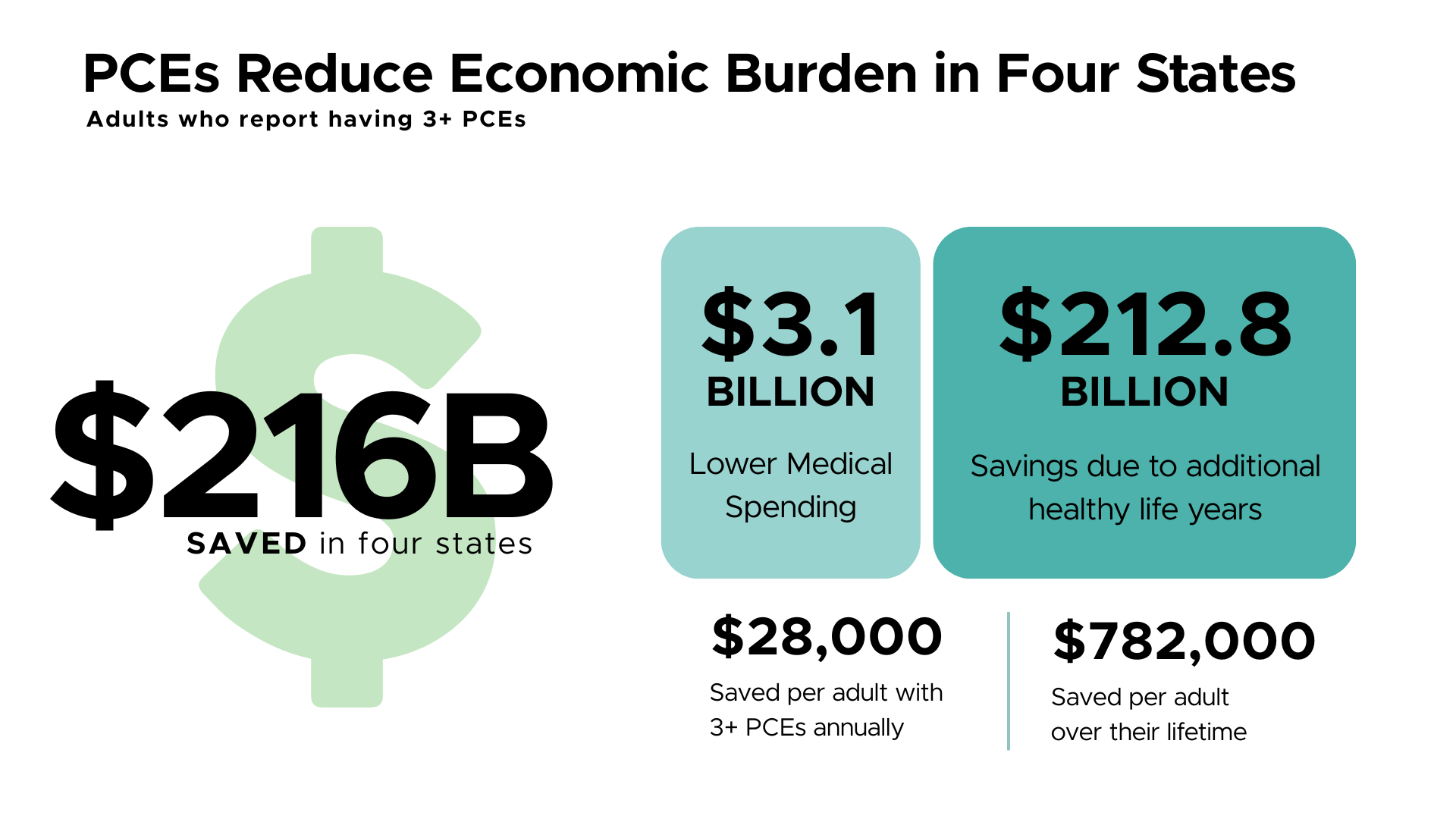
Positive childhood experiences (PCEs) set up lifelong health. Based on these findings, it’s likely that policies that promote PCEs will have an enormous economic impact. – Robert Sege, MD, PhD, Director of HOPE National Resource Center
Positive childhood experiences reduce medical spending costs and provide additional healthy life years
BOSTON, MA, July 29, 2025 – The HOPE National Resource Center, in collaboration with partners at the Centers for Disease Control and Prevention (CDC), Johns Hopkins University, Boston University, and Prevent Child Abuse America, published its latest study, “Positive Childhood Experiences and Health and Opportunity Outcomes in Four U.S. States,” in the JAMA Network Open. Analyzing Behavioral Risk Factor Surveillance Survey (BRFSS) data of over 20,000 adults from four states (Kansas, Montana, South Carolina, and Wisconsin), the research team found that positive childhood experiences (PCEs) were associated with an estimated $3.1 billion in lower medical spending costs and $212.8 billion in additional healthy life years (years not lost due to disability, ill health, or early death), for a total of $215.9 billion of economic value.
“Positive childhood experiences set up lifelong health,” said Robert Sege, MD, PhD, Director of the Center for Community-Engaged Medicine at Tufts Medical Center and Professor of Medicine and Pediatrics at Tufts University School of Medicine. “Based on these findings, it’s likely that policies that promote PCEs will have an enormous economic impact. These results may help seed ideas for improving support for children and their families.”

PCEs increase lifetime opportunities and reduce health risks
From 2015 to 2020, Kansas (2020), Montana (2019), South Carolina (2020), and Wisconsin (2015) each included 7 positive childhood experience questions in their annual Behavioral Risk Factor Surveillance Surveys, state-based telephone surveys that collect information on health-related behaviors and conditions. Over 20,000 respondents were collected across the four surveys. Their responses determined PCE scores ranging from 0-7 PCEs and were categorized into 4 groups: 0, 1-2 (low PCE score), 3-5 (medium PCE score), and 6-7 (high PCE score). 53% of adults reported high levels of PCEs, 35% reported medium levels of PCEs, 10% reported low levels of PCEs, and only 2.5% reported zero PCEs.
The investigators analyzed the BRFSS data for PCE-related associations, including life opportunities (e.g., completing college), health risk behaviors (e.g., smoking cigarettes), chronic conditions (e.g., heart disease), and general physical and mental health.
Adults with high levels (6-7) of PCEs reported a number of health benefits, including:
- 47% less likely to report heart disease
- 27% less likely to report diabetes
- 22% less likely to report chronic health conditions
Adults with medium levels (3-5) of PCEs reported similar health benefits to a lesser degree:
- 35% less likely to report heart disease
- 20% less likely to report diabetes
- 12% less likely to report chronic health conditions
Any level of PCEs (1+) helped reduce chronic obstructive pulmonary disease (COPD), or lung diseases restricting breathing, in 18% of adults. PCEs were also associated with a higher likelihood of post-secondary education, annual household incomes of over $50,000, and higher mental and physical health.
The researchers estimated that the reduction of chronic diseases due to PCEs resulted in an economic value of $28,000 per adult per year, or $782,000 over their lifetime. Chronic diseases examined included COPD, obesity, diabetes, asthma, arthritis, poor mental health, poor physical health, cancer, heart disease, and depression.
About HOPE – Healthy Outcomes from Positive Experiences
Based at Tufts Medical Center in Boston, Massachusetts, the HOPE National Resource Center sees a world that honors and promotes positive experiences as necessary for health and well-being. Research shows that positive childhood experiences (PCEs) drive healthy child development and lessen the lifelong effects of adverse childhood experiences (ACEs). HOPE aims to inspire a movement that changes how people and organizations advance health and well-being for children, families, and communities.
Robert Sege, MD, PHD, FAAP, Director of the Center for Community-Engaged Medicine at Tufts Medical Center and Professor of Medicine and Pediatrics at Tufts University School of Medicine, leads the HOPE National Resource Center.
Inquiries: HOPE@tuftsmedicalcenter.org


